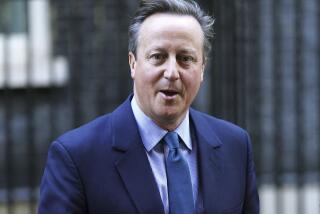Brown takes the helm of Labor
MANCHESTER, ENGLAND — British Prime Minister Tony Blair on Sunday handed over leadership of the Labor Party to his finance minister, Gordon Brown, who pledged that Britain would “meet our international obligations” in Afghanistan and the Middle East but called for going beyond military solutions to combating terrorism.
“Our foreign policy in years ahead will reflect the truth that to isolate and defeat terrorist extremism now involves more than military force -- it is also a struggle of ideas and ideals that in the coming years will be waged and won for hearts and minds here at home and round the world,” Brown told cheering supporters gathered for a party conference.
In recent weeks, Brown has repeatedly indicated that he stands behind Blair’s decision to support and help launch the invasion of Iraq in 2003 but has also said he believes that military and security efforts alone aren’t enough to fight militants.
He told party activists Sunday that an “essential contribution” that “daily becomes more urgent” is the lasting settlement of the Arab-Israeli conflict, with the creation of a Palestinian state and security guarantees to Israel.
Brown has also talked of launching major economic development initiatives in Iraq and elsewhere in the Middle East. He has not, however, publicly discussed speeding up the timetable for Britain’s planned phased drawdown of troops in Iraq.
For once, Blair was in the audience, listening and applauding as he relinquished leadership of the Labor Party after 13 years. He endorsed as his successor the man who helped him rebuild the party and take power in 1997 but who has also long waited for his own turn at the top.
“You know, people said it was impossible in our world of politics to have a stable and orderly transition of leadership, and we have proved them wrong,” said Blair, whose tumbling popularity over the Iraq war prompted his party to call for his departure midway through his third term.
“I know from his character that he will give of his best in the service of our country, and I know from his record as chancellor that his best is as good as it gets,” Blair said of Brown.
Smiling but subdued, Blair threw an arm around his chancellor of the exchequer and party rival and then walked offstage, pointing the cheering crowd back toward Brown.
Blair will formally step down as prime minister Wednesday, and Brown will hold the position at least until the next general election, which must be held by 2010. A poll for the Observer newspaper showed that 40% of respondents believe that Brown would make the most capable prime minister, compared with 22% for Conservative Party leader David Cameron. The Labor Party overall was 3 percentage points ahead of the Conservatives, a result Observer analysts attributed to Brown “bounce.”
The Labor Party elected Harriet Harman, minister of state for constitutional affairs, as deputy leader to help oversee the difficult campaign ahead to shore up waning public support.
Harman was one of the only candidates for deputy who called for the government to apologize for the war in Iraq.
“You want us to acknowledge the anger and division caused by Iraq, and we do, but we must give our total support to our armed forces as they support Iraq,” Harman told party activists.
Brown said he would boost the housing ministry to a Cabinet-level position and raise state spending on public schools to the level spent per pupil in private school education, a difference of 45%.
He also announced an initiative to align aid, debt relief and trade policies in an attempt to combat poverty, illiteracy, disease and environmental degradation around the world.
“My conviction [is] that when the strong help the weak, it makes us all stronger,” he said.
More to Read
Get the L.A. Times Politics newsletter
Deeply reported insights into legislation, politics and policy from Sacramento, Washington and beyond. In your inbox three times per week.
You may occasionally receive promotional content from the Los Angeles Times.










